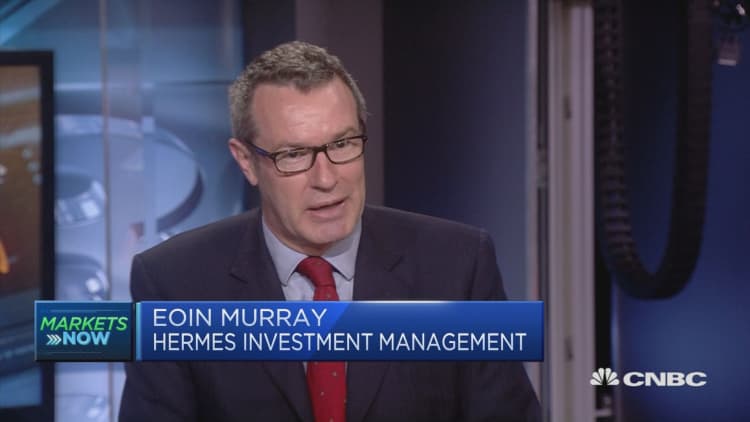International trade as we know it is unlikely to exist in the future and will instead be replaced with a regional trading system, one strategist told CNBC.
Speaking on CNBC's "Squawk Box Europe" Tuesday, Eoin Murray, head of investment at Hermes Investment Management, predicted cross-border trade would undergo a dramatic change as trade tensions continued.
"One of our views for many months has been that this isn't just a trade war, this is actually a tech war that is seeing globalization unravel. We'll probably end up with trading regions rather than world trade as we think of it today," he said.
Although the Sino-U.S. trade war is likely to have a big impact, Murray noted that the intensifying trade dispute between Japan and South Korea was also a signal there could be a significant shift in global trade practices.
"Underneath the trade dispute — trade's being used as a weapon here — are far more deep-seated influences that have been there since the Second World War, so that may take some more resolving too," he said. "For me, it just points to the fact that we're going to have trade tensions for a long time to come."

Technology is a key element of both trade spats. The U.S. has been pushing its allies to shut Huawei out of their 5G networks, claiming the telecoms giant's presence in the infrastructure could enable Chinese espionage. Huawei, among other Chinese firms, has also been placed on a trading blacklist that will prohibit them from trading with American firms without special licenses from the U.S. Department of Commerce.
Meanwhile, Tokyo has restricted exports of three chemicals used in the manufacture of semiconductors to South Korea. According to South Korea's Trade Investment Promotion Agency, the country has the second biggest semiconductor industry in the world.
Murray told CNBC that those trade tensions were "going to come more to the fore if we do go into a more easy cycle from central banks."
'Doing things differently'
Last month, Michael O'Sullivan, author of "The Levelling," told CNBC's "Squawk Box Europe" that the U.S.-led global empire was coming to an end and will be replaced by three distinct regional powers.
"Where we are going is toward a multi-polar world where there's going to be at least three regions — Europe, the U.S., China-focused Asia," he said. "The difference is not that they are all big or they are different empires, but they are doing things increasingly differently."
Hans Redeker, global head of FX strategy at Morgan Stanley, also told CNBC that U.S. tariffs on China and Mexico were examples of globalization deteriorating at a significant pace.

— CNBC's Elliot Smith contributed to this article.

